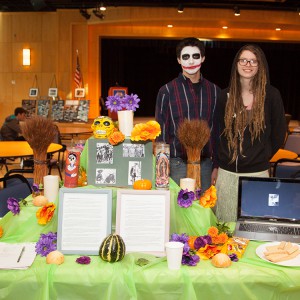As the World Turned
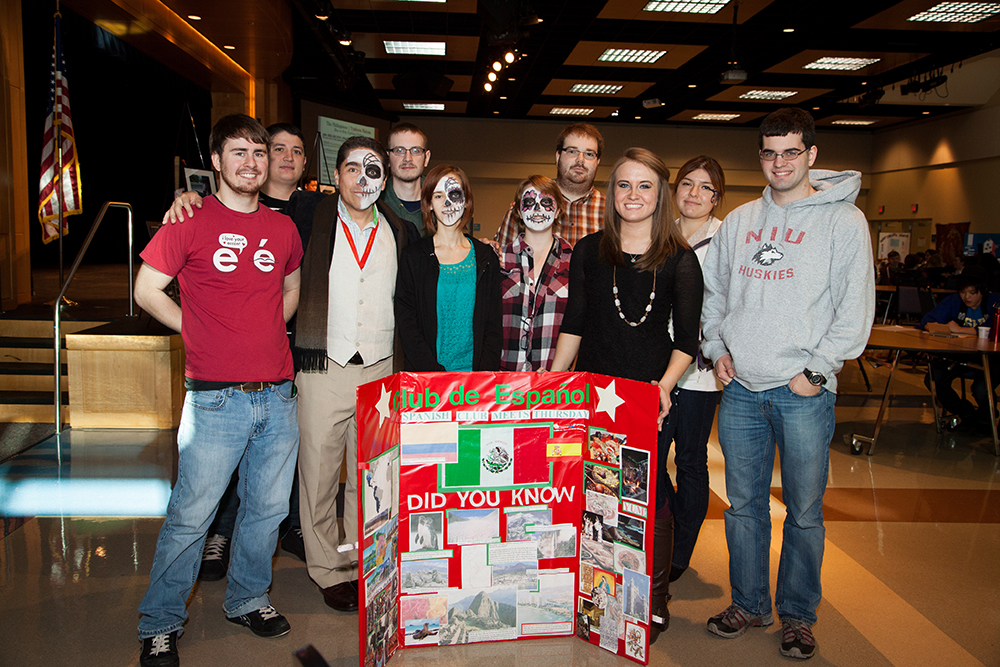
Spanish instructor Felipe Montoya, third from left, with members of the Spanish Club at the International Students Exhibit.
Clark College hosted a wide range of public events–including films, music, speakers, and panel discussions–during its observance of International Education Week, November 18-21. This year’s theme was “The Language of Learning: Creating a Sense of Place.”
International Education Week (IEW) is a joint initiative of the U.S. Departments of State and Education to highlight the importance of international education and cultural exchange. This is the fifth year that Clark has participated in IEW. According to committee member and International Student Recruitment & Outreach Manager Jody Shulnak, planning the week of activities took more than three months, and the committee is already looking forward to next year, possibly building on the success of this year’s International Photography Contest by working with the Archer Gallery to create an international art exhibit. “Stay tuned!” she said. “IEW gets bigger and better each year.”
Some highlights from this year’s IEW:
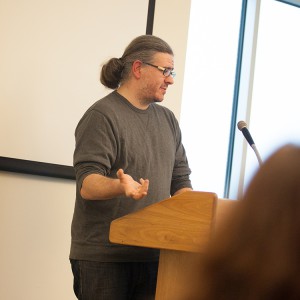
Ismet Prcic talks about writing his novel Shards.
Columbia Writers Series
The college hosted a reading on November 18 by two highly respected writers as part of its Columbia Writers Series. Ismet Prcic and Zachary Schomburg, winners of the 2013 Oregon Book Awards for Fiction and Poetry, respectively, read from their work and discussed their writing processes. Prcic, who teaches Drama at Clark, described how writing his novel, Shards, served as a way to process his experiences growing up in war-torn Bosnia. The book–Prcic’s first–is semi-autobiographical (the central character is named “Ismet Prcic”) and told through a fractured composite of diary entries, recollections, and speculative imaginings of what might have been.
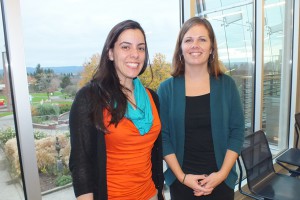
Former student Marisa Petry, left, introduced Spanish professor Erika Nava at the fall 2013 installment of Clark’s Faculty Speaker Series.
Faculty Speaker Series
On November 19, Spanish professor Erika Nava gave the fall presentation of Clark’s Faculty Speaker Series. Nava spoke about her experiences building online classes to teach Spanish. She acknowledged that many people are skeptical that languages can be taught online–including students. Indeed, she was introduced by a former student, Marisa Petry, who said she was concerned about getting enough support in an online environment. Instead, Petry found that Nava’s use of tools like embedded video and Skype allowed her to learn Spanish just as well as she would have in a face-to-face classroom. “Even today, I use it at the bedside,” said Petry, who is now working as a nurse. “And because of her course, I had the confidence to take other online courses.”
Nava said that she herself initially resisted the idea of teaching Spanish online. “My initial reaction was like many people’s: ‘No way, I’m not going to do that. How will I have the personal connection with students?'”
However, she found herself reconsidering that attitude after her first few years teaching at Clark. “I saw that I had a lot of nontraditional students in my classes who were working full-time jobs and were coming in late to class, really struggling to be there,” she said.
Nava showed some of the ways she makes her online classes feel more interactive and personal. Where many online modules include written instructions, she instead inserts video of herself speaking the instructions “so I can be more present in the class.” She has also connected to students while taking live video in Mexico, providing them with a sort of virtual study-abroad opportunity. Using technology in innovative and thoughtful ways like this, she said, can keep that personal connection between students and instructor strong, even in an online environment.
See video of Erika Nava discussing her approach to online learning.
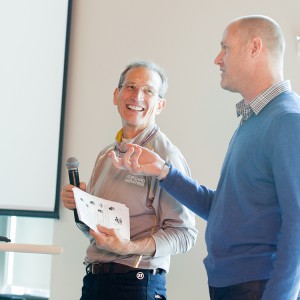
German professor Julian Nelson, right, translates the German children’s poem his student is reading.
International Read-In
On November 20, poetry filled the air of PUB 161 as students and staff read favorite pieces in different tongues. Sociology professor Carlos Castro read “Pueblo Tropical” by Nicaraguan poet Salomón de la Selva. English professor Jill Darley-Vanis read “La Beauté” from Charles Baudelaire’s Les Fleurs du Mal, and provided a handout showing the dramatic variations between three English translations of the poem. Student Joy Robertson-Maciel, meanwhile, read a prose passage in Portuguese from Brazilian writer Joaquim Maria Machado de Assis.
The prize for most gruesome readings, however, had to go to the students in Professor Julian Nelson’s German classes, who read from classic German children’s poems. One passage, from the classic collection Der Struwwelpeter, told the tale of a naughty child who sucks his thumbs–until a tailor chops them off. Another told the tale of a friendship between a cat and a dog, which ends with one of them getting shot. “There are no happy endings in German, sorry,” said Nelson with a laugh.
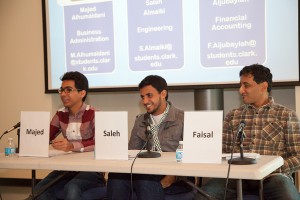
Saudi students Majed Alhumaidani, Saleh Almaki, and Faisal Aljubaylah talk about their country and culture.
Saudi Student Panel
Also on November 20, three international students from Saudi Arabia spoke about their country, its culture, and their experiences living in the United States. It was clear that life for a young person in America is very different from that of a young person in Saudi Arabia. For one thing, it’s lonelier; all three students spoke wistfully about their closely knit families and about the comfort of having lots of relatives living together. “When I was home, all my day was scheduled to be about my family,” said Saleh Almaki, the eldest of 11 children by his father’s two wives. “But here, every day is scheduled to be about myself.”
The students, all three of whom are Muslim, also expressed hope that they could help dispel American misconceptions about Islam. Faisal Aljubaylah said he wanted Americans to understand that “the first letter of Islam is ‘learn’–not just ‘learn about Islam,’ but ‘learn about other cultures and religions.'”
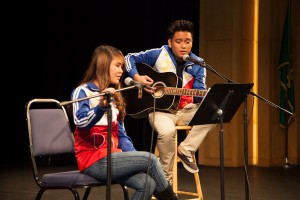
Students provided music during the International Student Exhibition.
International Student Exhibition
On November 21, students gathered in Gaiser Student Center to enjoy art and music with an international flair. Many students from instructor Felipe Montoya’s Spanish classes wore skeletal Day of the Dead face paint as they stood before the traditional Day of the Dead altars they’d created as extra-credit projects. In Mexico, these altars often honor deceased relatives–here, students created altars to celebrities passed. One was devoted to Michael Jackson, complete with framed fingerless glove; another, honoring Elvis Presley, included a guitar.
Students Amanda Murphy and Christian Fairchild sat next their altar honoring the spirit of Mexican revolutionary Pancho Villa. “We were going to go with a painter, but one student in our group is blind and wanted something she could enjoy, too,” explained Murphy, who is co-enrolled at Clark and at Portland State University. “We settled on a revolutionary. That’s a theme everyone can get behind: rebellion and revolution. We can all identify with that.”
Photos: Clark College/Jenny Shadley. Erika Nava Photo: Clark College/Hannah Erickson
More photos on Flickr.
